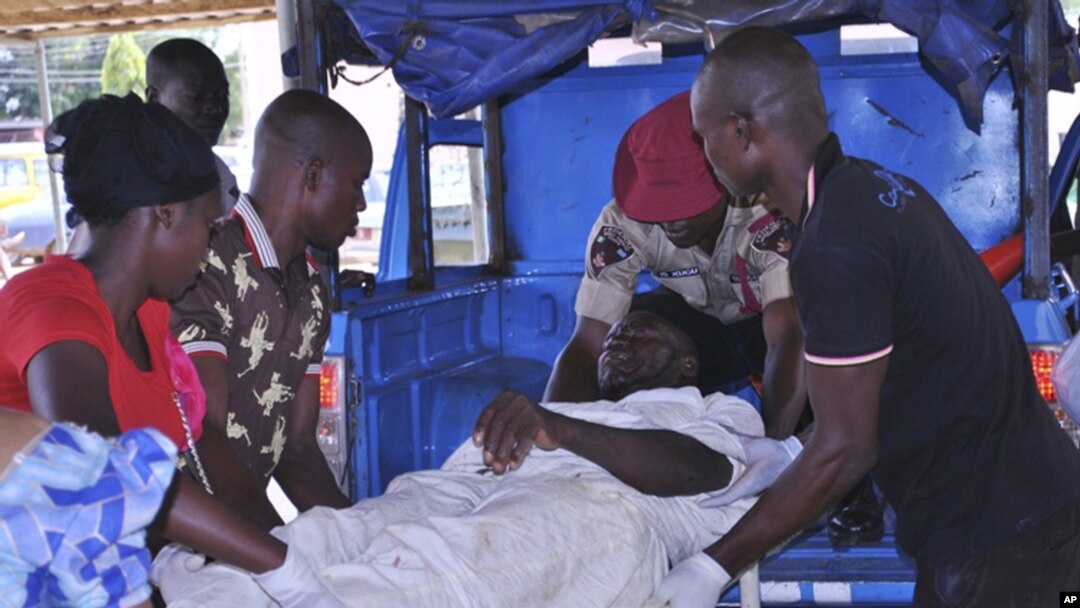ABUJA - The Nigerian militant group Boko Haram has claimed responsibility for three suicide bombings of Christian churches in Kaduna state Sunday that killed at least 21 people and wounded many more. The state remains under a 24-hour curfew after the bombings sparked reprisal attacks by Christians against Muslims.
The militant Islamist sect Boko Haram said it carried out the three suicide car bombings in a statement e-mailed to journalists late Sunday.
"We carried out these attacks," the statement said, "because Christians have enjoyed the support of government when they were killing Muslims and destroying mosques in northern towns."
The statement said the group would continue attacks against Christians, in particular against women and children. Christians, the statement said, must convert to Islam.
Boko Haram is known to communicate through such e-mailed statements to journalists, but the authenticity of this statement was not immediately verifiable.
Kaduna state is part of Nigeria's volatile Middle Belt region where the nation's primarily Muslim north meets its predominantly Christian south and where thousands have died in sectarian violence in recent years.
Though Boko Haram primarily targets the government and security forces, the sect pledged in January to "purify" the northern Nigeria of Christians as revenge for attacks on Muslims.
The bombings marked the third Sunday in a row that churches in the north have been targeted despite increased security.
In Zaria in the northern part of the state, suicide bombers used cars laden with explosives to hit two churches holding services, the Ecwa Church and Kings Catholic Church, reportedly within minutes of each other. A third bomber then drove a car into the Shalom Church in Kaduna city, the state capital.
Enraged Christian youth then reportedly set up roadblocks in Kaduna city, dragging motorists perceived to be Muslim from their cars and attacking them.
Muslim and Christian leaders in Kaduna have been working together to try to calm tensions since last year when disputes over the results of the presidential election sparked religious violence in the state that killed nearly 700 people.
Christian youth leader Diji Obadiah said Sunday's bombings and the mob violence that followed were a "very, very big setback."
"We are trying to build an understanding between Christian and Muslim youth. We are trying to build trust. We are trying to build a peaceful coexistence. And now, this thing happened and you know we are human beings. You can expect the pain that goes through the hearts of youths. But reprisal attacks, we also as Christians condemn the reprisal attacks," said Obadiah.
Human Rights Watch says Boko Haram has killed more than 1,000 people since the militant group's reemergence in the north in 2010, a year after the group was seemingly crushed in a government crackdown. The anti-government sect is demanding the broader application of sharia law in Nigeria.
Hilary Uguru contributed to this report from Warri, Nigeria.
Boko Haram
Boko Haram Facts- Based in the northeastern city of Maiduguri
- Began in 2002 as a non-violent Islamist splinter group
- Launched uprising in 2009; leader was subsequently killed in police custody
- Has killed hundreds in bombings and shootings since 2010
- Boko Haram translates to "Western education is sinful"
- Wants Nigeria to adopt strict Islamic law
- Says it will kidnap women and children as part of its campaign
- Has taken over parts of northeastern Nigeria
"We carried out these attacks," the statement said, "because Christians have enjoyed the support of government when they were killing Muslims and destroying mosques in northern towns."
The statement said the group would continue attacks against Christians, in particular against women and children. Christians, the statement said, must convert to Islam.
Boko Haram is known to communicate through such e-mailed statements to journalists, but the authenticity of this statement was not immediately verifiable.
Kaduna state is part of Nigeria's volatile Middle Belt region where the nation's primarily Muslim north meets its predominantly Christian south and where thousands have died in sectarian violence in recent years.
Though Boko Haram primarily targets the government and security forces, the sect pledged in January to "purify" the northern Nigeria of Christians as revenge for attacks on Muslims.
The bombings marked the third Sunday in a row that churches in the north have been targeted despite increased security.
In Zaria in the northern part of the state, suicide bombers used cars laden with explosives to hit two churches holding services, the Ecwa Church and Kings Catholic Church, reportedly within minutes of each other. A third bomber then drove a car into the Shalom Church in Kaduna city, the state capital.
Enraged Christian youth then reportedly set up roadblocks in Kaduna city, dragging motorists perceived to be Muslim from their cars and attacking them.
Muslim and Christian leaders in Kaduna have been working together to try to calm tensions since last year when disputes over the results of the presidential election sparked religious violence in the state that killed nearly 700 people.
Christian youth leader Diji Obadiah said Sunday's bombings and the mob violence that followed were a "very, very big setback."
"We are trying to build an understanding between Christian and Muslim youth. We are trying to build trust. We are trying to build a peaceful coexistence. And now, this thing happened and you know we are human beings. You can expect the pain that goes through the hearts of youths. But reprisal attacks, we also as Christians condemn the reprisal attacks," said Obadiah.
Human Rights Watch says Boko Haram has killed more than 1,000 people since the militant group's reemergence in the north in 2010, a year after the group was seemingly crushed in a government crackdown. The anti-government sect is demanding the broader application of sharia law in Nigeria.
Hilary Uguru contributed to this report from Warri, Nigeria.


